Kentucky Senator Rand Paul is taking a stand against former President Donald Trump’s tariff policies, and he’s not backing down—even though he seems to be fighting alone. Paul has long been a supporter of free trade and limited government interference in economic decisions. However, his opposition to Trump’s tariffs has left him in a tough position, as many in the Republican Party continue to align with Trump’s approach.
Why Is Rand Paul Opposing Trump’s Tariffs?
Rand Paul believes that tariffs are an unnecessary tax on American consumers and businesses. He argues that imposing tariffs on imported goods hurts foreign companies and raises prices for everyday Americans who buy these products.
Paul has repeatedly voiced concerns that tariffs disrupt the free market, making goods more expensive and hurting industries that rely on international trade. He has pointed out that when Trump introduced tariffs on products from China and other countries, it led to increased costs for American farmers, manufacturers, and retailers.
Paul argues that instead of helping businesses, tariffs have often backfired by triggering retaliatory measures from other countries. For instance, when the U.S. imposed tariffs on steel and aluminium imports, countries like China responded with tariffs on American agricultural products, harming farmers in states like Kentucky. He insists that free trade, without artificial price hikes caused by government intervention, is the best way to ensure economic prosperity.
A Lone Voice in the Republican Party
While some politicians have questioned Trump’s trade policies in the past, Paul is one of the few openly opposing them. The Republican Party has largely supported Trump’s America First approach, which includes imposing tariffs to protect U.S. businesses from foreign competition. Many conservatives believe these policies strengthen American industries by reducing dependence on overseas products.

However, Paul argues that instead of helping, tariffs are actually making it harder for businesses to operate. He believes the best way to strengthen the economy is through free trade agreements that allow companies to compete fairly on a global scale.
Even within the GOP, free trade has traditionally been a core principle, but Trump’s influence has shifted party opinion. Paul has found himself in a lonely position, where few Republican lawmakers are willing to challenge Trump’s economic policies.
What This Means for the Future of U.S. Trade
Paul’s battle against tariffs isn’t just about making a statement—it’s about shaping the future of U.S. trade policy. If tariffs continue, consumers may see higher prices on everyday goods, from electronics to groceries. Additionally, American companies that export products may face retaliation from foreign governments, making it harder to sell their goods overseas.
For instance, the automobile industry is one sector that has been hit hard by tariffs. Many car manufacturers rely on foreign steel and aluminium, and when tariffs increase the cost of these materials, car prices rise, making vehicles more expensive for American buyers. Similarly, industries that depend on global supply chains, such as technology companies, experience disruptions when trade policies become restrictive.
While Rand Paul’s voice may not be the loudest in Washington, his stance on tariffs highlights an ongoing debate in the U.S.: Should the government step in to control trade, or should the free market dictate prices and competition?
The Impact on Kentucky and Beyond
As a senator from Kentucky, Paul strongly focuses on how trade policies affect industries in his home state. Kentucky is home to many manufacturing and agricultural businesses that rely on international trade. Higher tariffs could mean fewer sales and job losses in these industries.
Farmers in Kentucky, for example, have already faced challenges due to tariffs that led to decreased demand for crops such as soybeans and bourbon. By challenging Trump’s policies, Paul is advocating for these local businesses that depend on free trade to thrive.
Additionally, Paul’s opposition to tariffs aligns with his broader economic philosophy of reducing government interference in markets. He believes that trade barriers should be eliminated rather than increased, as this would allow American businesses to compete more effectively on a global scale.
Will Paul’s Opposition Make a Difference?
Despite his efforts, Rand Paul faces an uphill battle. Trump continues to hold significant influence over the Republican Party, and many of his supporters believe tariffs are necessary to protect American jobs.
However, as economic concerns grow and inflation remains a pressing issue, more politicians may start questioning whether tariffs are truly beneficial. If Paul continues to push his message, he might influence future trade policies, especially if new leaders in the Republican Party begin to take a different stance.
The upcoming elections and shifts in global trade agreements could also determine the future of tariffs in the U.S. If economic conditions worsen, more lawmakers may join Paul in advocating for lower trade barriers.
Conclusion
Rand Paul’s opposition to Trump’s tariff policies might not be the most popular stance within his party, but it brings up an important debate about the role of government in trade. While many Republicans support tariffs as a way to protect American industries, Paul sees them as a burden on consumers and businesses.
His fight against tariffs represents a larger battle between government intervention and free-market principles. Whether or not Paul’s efforts lead to major policy changes, his stance ensures that the conversation about tariffs’ economic impact remains relevant.
As the discussion continues, it remains to be seen whether Paul’s efforts will lead to policy changes or if Trump’s approach to tariffs will continue to dominate Republican trade policies. Either way, his fight highlights the ongoing struggle between government intervention and free-market principles in the U.S. economy.
Disclaimer: This article has been meticulously fact-checked by our team to ensure accuracy and uphold transparency. We strive to deliver trustworthy and dependable content to our readers.








